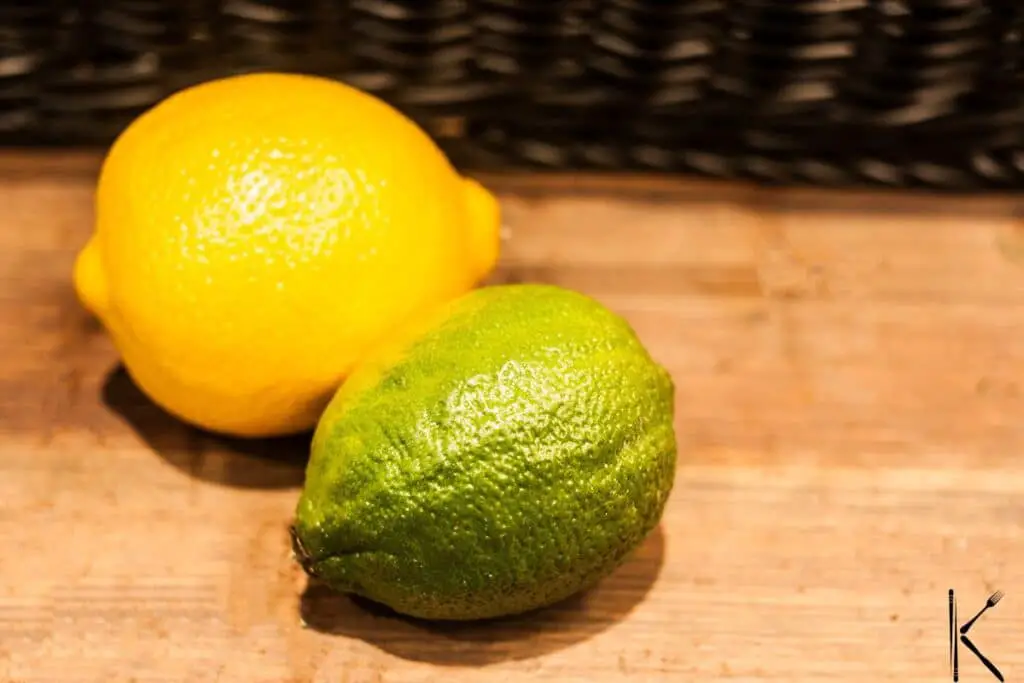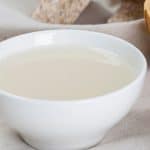In summary: There are some of the best substitutes for lemon juice, such as limes, distilled white vinegar, white wine vinegar, lemon extract, etc. Each substitute is described with its suitable uses and recommended quantities for substitution.
Lemons can add delicate notes as well as punchy flavors to a variety of dishes from lemon tart and cake to grilled fish and pasta.
The yellow citrus fruits have a characteristic tangy, bright, juicy pulp. It is exactly this strong citrus flavor that makes them so versatile in sweet and savory recipes alike.
If your recipe calls for lemons or lemon juice and you’re out of stock, there are several alternatives you can use instead. Due to their versatile use, the best lemon juice substitute will vary depending on the recipe you are making.
In this guide, we’ll help you choose a matching lemon substitute to create the perfect flavor profile for your dish.
How to Use Lemons In Cooking
Lemons can be used in the following applications:
Dressings, Garnishes, and Sauces
Lemons add a great punch and brightness to salads whether incorporated into a dressing or served as a wedge. When squeezed over fried foods, the acidity aids in the digestion of fats. In cooked sauces, it helps to balance out other flavors.
Baking
Citrus can act as a raising agent catalyst in baked goods. Some baking recipes call for lemon juice or vinegar as the acidity activates baking soda or baking powder for a light and airy risen baked product.
Marinades
Along with spices and oil, citrus is a marinade superstar due to the acid content. The citric acid denatures the proteins in the meat which acts as a tenderizer.
When raw seafood is left in the acidic liquid it will ‘cook’ which means it can be eaten without having to be heated. Referred to as ceviche, this raw seafood dish is safe to eat and absorbs great flavor while being marinated.
Garnish
Sliced lemons in a drink, a jug of water, or alongside fish can make an appealing and functional garnish. It adds to the depth of flavor and brings a bright citrusy aroma.
Preserving Food
A squeeze of the citrus juice over sliced avocados, apples, or bananas prevents them from browning since the acidity slows oxidation. This also means that more vitamins are retained. A few drops added to freshly squeezed juice or smoothies will also help retain the vibrant color for longer.
How to Choose a Substitute for Lemon
The best substitute will be determined by the flavor profile as well as the lemon’s purpose in the dish.
When choosing a lemon juice substitute, first consider the role it plays in your recipe. Is it utilized for acidity, a particular flavor profile, or the way it combines with other ingredients? Not all replacements will be appropriate for every situation.
Remember that the acidity, color, and flavor of your food may be affected by the alternative you choose.
What Can I Substitute for Lemon Juice?
Here are the best replacement for lemon juice you can find around your kitchen:
#1. Limes
You might be wondering ‘Can lime juice be substituted for lemon juice?’ The short answer is yes.
These small green citrus fruits have a somewhat different taste but feature a similar acidity level. Limes are one of the most suitable all-round substitutes since they can be used in sweet and savory dishes.
Since they’re smaller, extracting lime juice may be a little more labor-intensive if you require a large amount and they can have a slightly bitter undertone. Limes are, however, a great option as a lemon replacement for any application from preserving and ceviche to baking.
Substitute quantity: Replace lemon juice with lime juice in equal amounts.
Best for: Dressings, marinades, baking recipes, tarts, drinks, garnishes, stews, curry, chicken, and fish dishes.
#2. Distilled White Vinegar
White vinegar has a high acidity level and can work well as a substitute in small amounts. However, using too much will quickly overtake your entire dish, so use caution.
Since it has a fairly neutral taste and appearance, it won’t affect the flavor profile or color of your dish. If the lemon flavor is important in your recipe, skip this one and rather grab some limes.
Substitute quantity: Use only a ¼ tablespoon of white vinegar as a replacement for one tablespoon of lemon juice.
Best for: Marinades, tenderizing, stews, and as a raising agent catalyst in baking recipes. It can also be added to water when boiling eggs or veggies.
#3. White Wine Vinegar
White wine vinegar is not quite as harsh as distilled white vinegar. It is made from fermenting white wine which gives it a slightly sweeter and milder profile than white vinegar. It is best to use this option as a substitute in recipes that require only a small amount of acid.
Substitute quantity: Use only half the amount required in your recipe to prevent overpowering the dish. If the recipe calls for one teaspoon of lemon juice, use a half teaspoon of vinegar.
Best for: Hollandaise, vinaigrettes, pickles, marinades, stews, and as a catalyst for raising agents in baking.
See more: White wine vinegar alternative
#4. Lemon Extract
If the lemony flavor is the most important part of your dish, this is a great option for sweet baked goods. In most grocery stores you can easily find the extract in the baking aisle.
The extract is a concentrated artificial flavoring without the inherent bitterness, tartness, and acidity of the citrus fruit. Since this is only suitable as a flavoring, it won’t be a good choice for any recipes that require acidity or sharpness.
Unlike lemon juice, the extract won’t curdle dairy products which means it can also be used to flavor creams and puddings.
Substitute quantity: Use only a few drops to flavor baked goods. Keep in mind that the flavor is very concentrated. Large cake or muffin batters may require up to one teaspoon while frostings will only need a few drops.
Best for: Cakes, cupcakes, muffins, desserts, candy, and frosting.
#5. Apple Cider Vinegar
Made from fermented apples, apple cider vinegar is a great substitute to match the acidity and sharpness. It is a little sweeter and may bring a slightly different flavor to your dish as a result.
It is best suited to recipes that require only a small quantity and will effectively balance sweetness and add crispness.
It works well with tomato-based sauces and can be used as a substitute for warming health drinks. Use apple cider vinegar in hot drinks along with spices such as cinnamon or ginger and honey.
Substitute quantity: Replace apple cider vinegar in equal measures.
Best for: Pickle bases, marinades, stews, soups, sauces, and as a catalyst for raising agents in baking.
See more: Apple cider vinegar substitute
#6. Dry White Wine
Dry white wine such as sauvignon blanc won’t give the same flavor but it will add a slight tang with fruity undertones. Where other wines may be too sweet or alter the color of the dish, dry white wine is perfect with its neutral color and slight acidity.
When using wine in cooking, make sure to cook the alcohol out to prevent having a raw alcohol taste in your dish. This is not a suitable substitute for baking.
Substitute quantity: Use dry white wine in equal quantities
Best used in: Sauces, stews, pasta sauces, chicken, fish, pork, and seafood dishes.
#7. Cream of Tartar
Cream of tartar is an acidic by-product of winemaking. The fine white acidic powder is used as a leavening agent in baked goods and to stabilize whipped egg whites. In addition, it also helps to prevent sugar crystallization.
Cream of tartar is best used in very small amounts. Using too much will result in a tinny or metallic taste in your dish.
This is not a suitable lemon juice replacement if you need flavor and is generally only recommended in baking. You can also add a pinch to boiling water when cooking vegetables to help them retain their bright flavor.
Substitute quantity: When replacing lemon juice with cream of tartar, use only half the amount your recipe calls for. For example, for every one tablespoon of lemon juice, use only half a tablespoon of cream of tartar.
Best for: Baked goods such as cakes, cookies, and meringues.
Related: Cream of tartar replacement
#8. Celery Juice
Celery juice is very nutritious and although it is not suitable in dishes where a prominent citrusy flavor or acidity is important, it does bring freshness and complexity of flavor.
Substitute quantity: Swap out celery juice in equal quantities. In some cases, you may want to add up to twice the amount recommended.
Best for: Stock, sauces, and soups.
FAQs
Can I use orange juice as a substitute for lemon juice?
Yes, you can use orange juice as a substitute for lemon juice, but it depends on the recipe. Oranges have lower acidity and higher sweetness but can work well in salad dressing and chicken dishes. Keep in mind that the flavor will not be the same, although it can offer a yummy twist to your dish. It won’t be suitable in dishes where high acidity is required such as ceviche or as a raising agent catalyst.
Can I use grapefruit as a substitute for lemon?
Yes, you can use grapefruit as a substitute for lemon. As with oranges, it depends on the recipe. Grapefruit juice can be used in salad dressings but won’t be suitable for most other applications. Grapefruit can have a fairly bitter taste so make sure to balance this out with honey or another sweetener in salads.
Is bottled lemon juice the same as a freshly squeezed lemon?
Bottled lemon juice is not exactly the same as freshly squeezed lemon juice. While bottled juice offers convenience, it may lack the nuanced flavors and aroma of freshly squeezed lemons due to processing and storage.
What is the equivalent of juice of one lemon?
The equivalent of juice of one lemon is approximately 2 to 3 tablespoons, which is often used as a standard measurement in recipes as a substitute for the flavor of freshly squeezed lemon juice.
Conclusion
Lemons are such versatile fruits and bring a fabulous pop of flavor to sweet and savory dishes. When choosing the best lemon juice alternatives for your dish, you need to consider the flavors as well as the acidic properties required. Not all replacements will work well in all recipes.
If the citrus taste is what you’re after, opt for limes. In baked goods, the lemon extract will also bring a beautiful fresh flavor. If the acidity is important, apple cider vinegar and white wine vinegar are both good choices.
Since most of these substitutes have a strong flavor or acidic profile, use them with care and add only small amounts at a time. Happy Cooking!
See more: Fresh lemon juice shelf life









